The Rebibbia prison on the outskirts of Rome is known for having hosted a historic meeting: that between John Paul II and Ali Agca, who had tried to assassinate him. On December 18, another Pope came to visit that prison: Benedict XVI. He met with the inmates, conversed with them, took questions from them, and prayed an Our Father together with them.
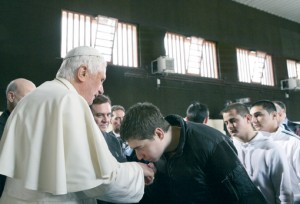
Benedict XVI’s visit to the juvenile prison of Casal del Marmo in Rome on March 18, 2007. After the Mass the Pope met the young inmates and officers of the Penitentiary Police
Then he planted a tree in the garden in memory of the visit.
It was not Benedict’s first encounter with prison life.
During Lent in 2007, on March 18, Benedict XVI visited the children of Casal del Marmo, the juvenile prison in Rome where there are 50 boys aged 14 to 18 years, adolescents, mostly outsiders and outcasts.
He wanted to listen, to pray with them and especially to witness to the love of God, who, the Pope said, is “a merciful and faithful Father, despite the mistakes of his children. It is an opportunity to decide to ‘get up and go,’ to abandon sin and to choose to return to God. Let us make together this journey of inner liberation.”
The following year, on March 12, 2008, the inmates of Lanciano were received by the Pope after the general audience in Piazza San Pietro. Accompanied by officers of the Penitentiary Police, a group of prisoners from the prison of Lanciano was able to attend the audience with the special permission of the Court of Supervision.
They were led by the ordinary of the Lanciano diocese in Abruzzo, Bishop Charles Ghidelli.
Benedict XVI, in his catechesis, spoke on the condition of prisoners and the suffering caused by injustice inherent in so much of human justice. “Every prisoner,” he said, “whatever the reason he ended up in prison, senses how burdensome this particular human condition is.”
The Pope recalled the figures of Cassiodorus and Boethius.
“Even in prison it is possible to pray in dialogue with the One who saves us,” he said. “Adverse fortune enables us to discern false from true friends, and makes it clear that nothing is more precious to man than true friendship. The difficulties of life not only reveal how adverse fortune is short-lived, but are useful even for identifying and preserving authentic relations among men.”
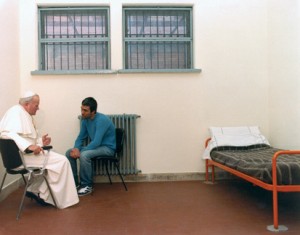
Left, Blessed John Paul II visits with Mehmet Ali Agca in a Rome prison Dec. 27, 1983. Their meeting came two years after Agca was arrested for shooting the pontiff in St. Peter’s Square. The pope publicly forgave his assailant (CNS file photo by Arturo Mari)
The Pope reserved a special greeting for the prisoners of Lanciano. “I hope that this meeting will spur each to reassert his fervent adherence to the teachings of the Gospel.”
On behalf of the prisoners, one of the attendants gave the Pope a green cap with the crest of a group of volunteers. Benedict XVI accepted it with a big smile.
In June of 2009, the Pope met the inmates of the prison of Monza, Italy.
They gave Benedict XVI a “tent of the Word” — a wooden box to hold a Bible (the inmates there have manufactured these boxes for some time).
For the Pope, they made a special version in white oak, embossed with the Star of David and the arms of the pontiff.
The box is similar to those produced for the Pauline publishing house, which commissioned 2,000 of these “tents” for their bookstores throughout Italy.
In April of 2010, the Pope wrote a message to prisoners in Malta during his trip to that island in the Mediterranean.
In his letter, sent in response to their message on the occasion of his apostolic visit to the island, the Pope expressed his “deepest appreciation” for the sentiments expressed in their message and heartily thanks the inmates who assured him the support of their prayers.
The inmates said they were somewhat comforted by the fact that the first evangelist of the island was St. Paul, who arrived in Malta as a prisoner, and therefore sharing their condition.
Benedict XVI stressed that St. Paul, “although a prisoner, had the inner freedom to ‘rejoice in the Lord,’ convinced that ‘neither death nor life, nor angels, nor principalities, nor things present nor things to come, nor powers, nor height nor depth, nor any other creature can ever separate us from the love of God which is in Jesus Christ our Lord.’”
The Pope concluded his letter saying he was near to all who are in prison, and invoking his blessing on them with “a pledge of strength and peace in the Lord.”
On July 4, 2010, there was another visit to a prison, this time in Sulmona, Italy.
“I am happy to be with you,” the Pope said. “I wanted to meet you all, so bring my greetings to other inmates,” he said. “I am always close to you, and I pray that the Lord help you on this difficult journey: I’ll keep you in my heart, and with all my heart I hope you can find a way to make a contribution to society, according to your abilities and the gifts that God has given. In my prayers you are always present.”
With these un-scripted words, away from microphones and cameras, Benedict XVI greeted the prisoners of Sulmona.
During his pastoral visit to the city, on the occasion of the jubilee declared by the bishops of the region Abruzzo-Molise for the 800th anniversary of the birth of St. Peter Celestine, the Pope again tackled the delicate issue of the suffering of prisoners.
During a brief greeting, not in the program, the prison chaplain, Marist Father Franco Messori, in the rectory next to the bishops’ residence, introduced the Pope to several prison guards and five of the 420 prisoners (the youngest was named Catalin, about 30 years old, from Romania).
“I asked the Pope for a word of light and hope, in a message which through these five men could reach all the prisoners in Abruzzo and in other prisons of Italy,” the chaplain said.
This private meeting with Pope Benedict XVI lasted about 10 minutes.

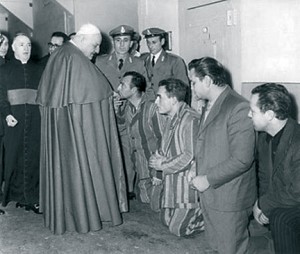
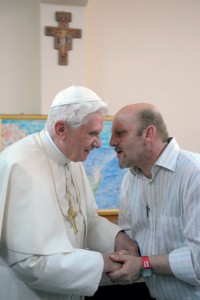

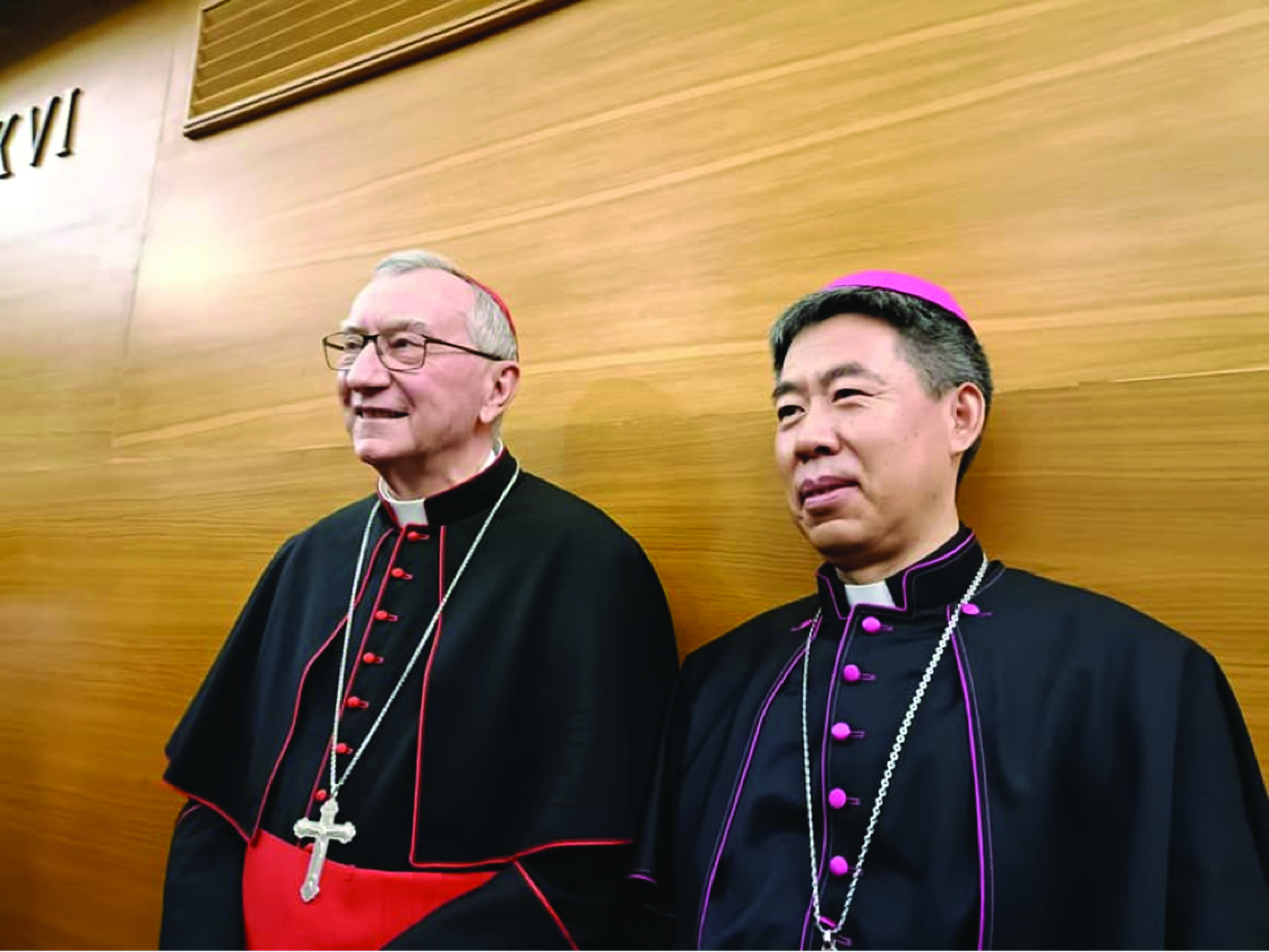


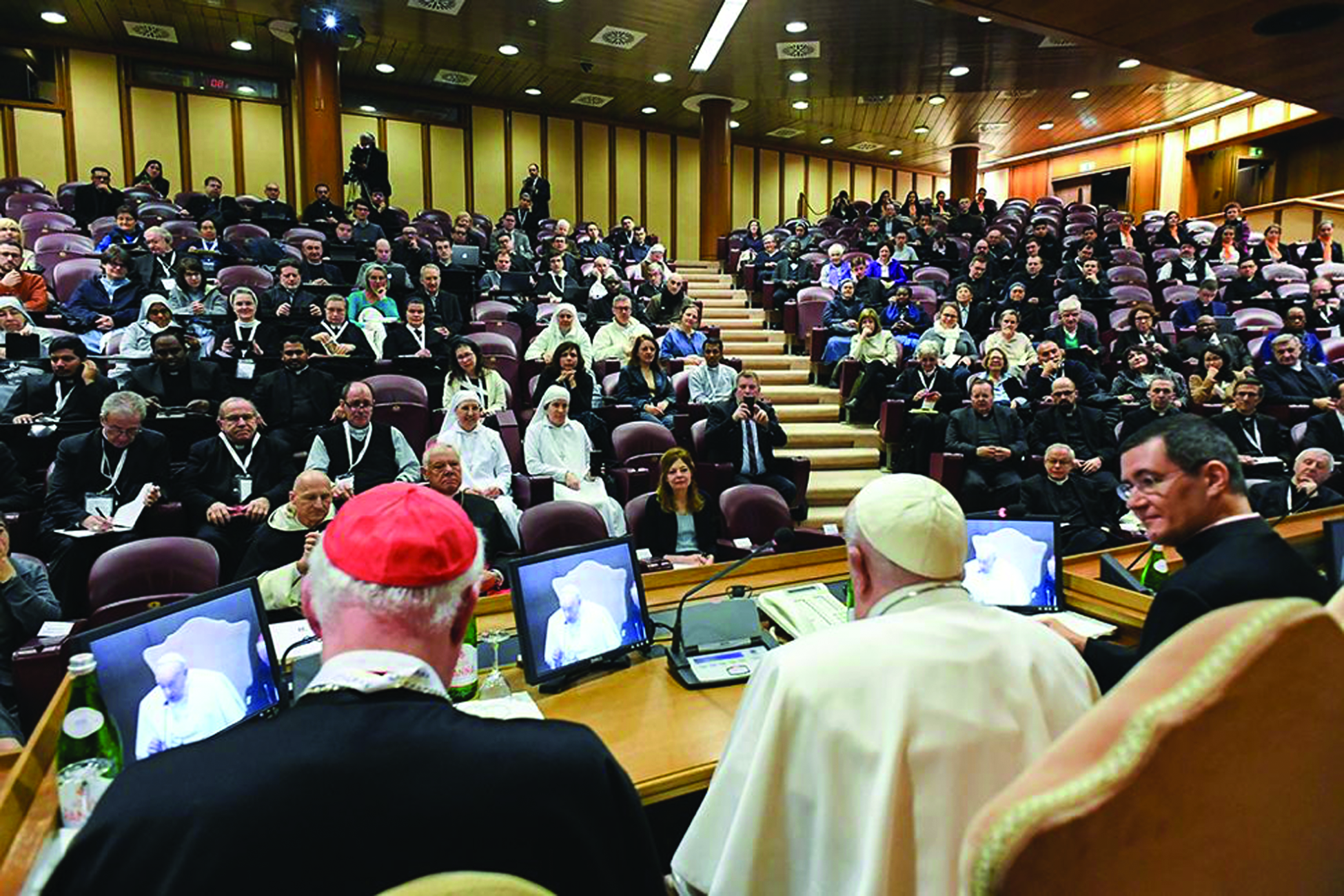
Facebook Comments